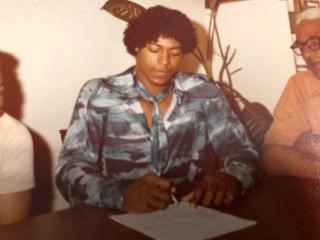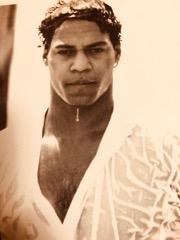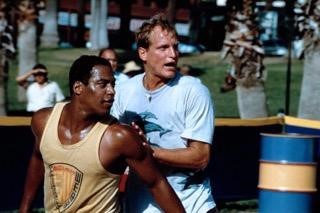By Julianna Friel and Brianna Knight
Cylk Cozart is a person who many people have seen on television and movie screens, but in the 1960s, he was a young boy with big dreams named Calvin living in the Karns community. Cylk started by telling us where his life started; “I was adopted to a family in Karns. My mom was 16, and she could not keep me the way she was living her lifestyle. Mr. and Mrs. Goss took me in, and I didn’t have to change my name or anything because they made sure I knew who my mother and father was. By the time I got to Karns, I was a 3rd grader; it was an all-black school called Solway. There were probably 20-25 kids because that was when everything was so separated. It was blacks are here, whites are there for whatever reason, and at that time we didn’t realize that was something that was wrong, it was just school; I mean, you didn’t see anybody else.” Cylk did follow his dreams, despite the hardships. As he grew up, Cylk found a huge influence in pop culture. Cylk said: “ I used to watch television until it was time to go to bed; I would watch anything. I loved the old TV shows, I would picture myself in the scenario and I would act out the scenes. I wouldn’t do it in front of anybody, I would just do it because I liked doing it. I didn’t know I was bad or good or indifferent. It was a release.” He had some trouble breaking into the business when he was young. It was brought to our attention that the staff of the theater department would not let Cylk audition for a play; “they always said the same thing: ‘there are no characters for people of your kind.’” However, he became a successful entrepreneur, actor, and director.
Cylk went on to talk about his years at high school; sophomore year in particular. “By the time I was a sophomore, a few basketball players befriended me, Steve Perryman and Steve Heptinstall; when the KKK murdered my dog,

Steve Heptinstall’s father said, ‘Stay with us; let the KKK come over here. It’d be the fourth of July if they come over here.’” Both Steve Heptinstall and Steve Perryman kept their doors open for Cylk to have a safe place away from all the threats.
Along the course of the interview, we noticed that sports seemed to have a huge impact on Cylk’s life. Cylk did not want to say any names, but it was brought to our attention that even in 1971 things still were highly unfair. “The coach literally said to me: ‘Cozart, you get the idea of playing quarterback out of your head. Ain’t nobody gonna play a colored quarterback; y’all ain’t got the brains.’” However, that year, the University of Tennessee hired an African-American quarterback. “His name was Condredge Holloway Jr.; I met him at UT for an all-sports camp when I was 13.” Cylk got the chance to go back to see Condredge with the escort of Gus Manning, the athletic director. Cylk expressed his shock to us about finding out that a black man would be the new quarterback, and how that made him feel due to what was previously said to him by his coach. The athletic director, Gus Manning, said to Cylk basically that color has nothing to do with anything in one’s ability to play sports. “You need to be around some positive people there, son; that’s got nothing to do with it.” After the meeting, Cylk was back with high school football. He told us how the last game was a success; he actually got to take action in the game―he scored two touchdowns and the coach made the quarterback pitch it to Cylk for him to throw.
Being that Cylk had just played the last game of the football season, that meant that basketball season was starting up. “That Saturday,” Cylk started, “I walked from the football locker room across the street to the basketball gym. The coach and the assistant coach met me in there…” The coach told Cylk that they needed to have a little talk. The coach stated: “We decided that you’re not gonna play here your senior year.” The coaches decided that he was not going to be playing because it was rumored that Cylk was dating a white girl; he was not. He questioned the coaches, but what good was that going to do? Cylk went on to say, “That was the year; that was the year we were probably gonna win state. We had a really good team.” The coach went on to explain by saying, “We’re gonna go downstairs in the locker room; the team is waiting on us, and we’re gonna take a vote. If one player doesn’t want you to play, you’re not playing.” Cylk felt confident about what “the guys” would say; they had all, for the most part, become really good friends. There were two freshmen on the team at this point; the coach only acknowledged the freshmen knowing they would be least likely to say yes. The coach told Cylk to go wait outside, so outside he went. A few minutes later, the coach let Cylk back in, and when he came back in he saw how his friends were standing: “A couple of my friends were like this…” Cylk motioned that they were standing with their arms crossed, faces mad. He automatically knew something was up; the coach read “yes, yes, yes…”. The fourth one was ‘no’. Cylk continued: “it was one person. And I know who it is. I didn’t know then, but I knew a little later: it was a freshman.” Cylk expressed to us that telling his family that he was not going to play was the hardest part. He left Karns the last part of his senior year to go play, and finish his high school education, at Loudon. Cylk ended up getting a scholarship while playing with Loudon.
Once Cylk graduated from high school, he went to Montreat college through his scholarship. Montreat was a four year college; however, afterwards he attended King college.


After Cylk finished college he went on to play in the NBA summer leagues; however, he got hurt during tryouts and could not finish through to the NBA. Instead, he went to Miami, Florida, and started his modeling career.

That was when Cylk joined the entertainment business from a professional point of view. The first job that was offered to Cylk, as an actor, was for a role as a baseball player; luckily, Cylk knew quite a bit about the sport, for it was just another one of the many things at which he was talented. If he had not have been in Miami at the time, he probably would not have been fortunate to have gotten the call about the part of “Alvin ‘Wallstreet’ Chandler.” Cylk said, “I always played baseball when I was a kid, but I got hurt when I was twelve years old batting, playing against older guys, and that’s why I hated baseball ever since; UNTIL THIS MOVIE CAME UP!!” The movie was called Blue Skies Again. “After that, I knew I needed to be in Hollywood at one point, but everybody said ‘If you can make it in New York, you can make is anywhere’; so, I met a photographer, Michael Paris, who was a great photographer. We just hit it off, we played basketball a little bit before he left Miami― he was just there looking at models in different agencies.” Cylk’s portfolio got to Michael, and they had an instant connection: basketball. “He actually stayed over for a few more days in Miami, and he said, ‘when you come to New York you can stay with me.’” About two months later when Cylk left Miami for New York, he took Michael up on his offer; Cylk remembers, as he showed up on his doorstep, Michael saying: “Come on in.” He stayed with him for a few months, sleeping on the couch. Cylk ended up joining a modeling agency in New York, and he also picked up an audition for The Cosby Show; it was between Cylk and the guy that ended up getting the part. Cylk stated: “After that, I just stayed in New York for two years, went to Europe, still did major commercials, went to France and all over Paris. I came back and I wanted to go to Hollywood, so I just took off to L.A.” Cylk told us that once he got to California he just went straight to Hollywood and rented a room in the Holiday Inn for a few months: “I paid from $300-$400 a month. I made friends with the drivers and the people who worked there, so they answered my phone like I had an office for two months. I paid the doorman. I had a room for meetings, and that’s kinda how I got started.”
To finish off our interview with Cylk, we decided to ask him about some of his favorite memories from sets; he had a lot to tell us. Cylk told us about White Men Can’t Jump.

Cylk started, “Woody Harrelson always liked to bet on the shot. So we were all messin’ with him; the others players were like ‘c’mon Woody, let’s take some of that Cheers money you got’ and Woody would bet like 100 dollars that he would make the shot and he would lose….” Right away in this particular memory, we noticed that there were a lot of fun times on set, whether it was jokes, mess ups, or just plain improv― like in this case. Cylk continued, “When we were doing my scene, where I make him shoot the hook shot to get on Jeopardy and I say ‘if you make it from there I’ll let your girl on the lot’, so that whole day we were betting on Woody whether he would hit the shot or not; he didn’t know. When it came time for him to shoot it, I made up basically that last part of that scene,” The guys all made Woody shoot from a ways out, and with the little chance that he would actually make, they were betting high. Woody said back to the guys “What, do you want me to punt it up there!?” Cylk and the guys just replied with, “Yeah, and a hook shot.” They were betting 100 dollars a shot, and he missed nine of them, so the bets just kept building up. “Right before he took the tenth shot, I went up to Woody and said, ‘this is $1000 on this shot if you make, but you ain’t gonna hit it’ and then he hit it. I had to pay him $1000, and he only hit on the last one.” The last shot that Cylk remembers is actually the scene that was used, and it was entirely improv. Little did the viewers know, and Woody too, that there was a bet going on behind the camera.
Along the way, Cylk has met multiple people, exchanged journeys, and gained and shared knowledge.


When you are in the entertainment business, it is really easy to meet lifelong friends and mentors. One friendship in particular for Cylk is Morris Chestnut. We got the chance to talk to Morris and get his perspective as to who Cylk is as a person. He replied to us saying, “He has been one of the nicest and most genuine people I have ever met in this industry. He always spreads positivity and always has a smile on his face. He is someone that I trust. A lot of people come and go in Hollywood, but you are quickly able to identify good and bad people, especially in this industry. I think it speaks a lot of volume to the type of person he is because it is so rare to find someone like him in this industry.” One of the last things Cylk said to us before we concluded the interview was, “All these people I have met over the years, not just actors but people who work on the sets, seems to come in either through basketball or already in the business; so now I want to come back and help Knoxville― so that’s why I’m bringing movies here. And I wanted to start with Karns.” Along the way Cylk has learned, taught, and realized that talent is not about race, but what kind of person you are and what kind of ability you have. Cylk has come back to Karns, Knoxville and started a production company to help kids develop what talent they have inside of them. He hopes to help kids discover what the truth behind talent is and what it is on the inside, not the outside, that matters.


Calvin was a year ahead of me at Karns. Although we were not friends I remember him as a friendly and polite guy. I had no idea he was famous until I stumbled across this article tonight.
Linda Ray
LikeLiked by 1 person